Languages
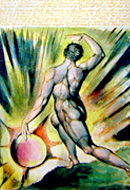 The Holy Land of England
The Holy Land of EnglandThursday, November 10, 2011 by Liam Hoare | Jewish Ideas Daily » Daily Features
The King James Bible, along with the Book of Common Prayer, Shakespeare, and Milton, transformed the English language, introducing a vibrant lexicon that is used to this day. It also fused biblical mythology with concepts of English national identity.
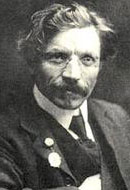 Meet Sholem Aleichem
Meet Sholem AleichemTuesday, July 19, 2011 by Nahma Sandrow | Jewish Ideas Daily » Daily Features
In the 1880's, the Ukrainian Jew Solomon Rabinowitz began his literary career under an assumed name—assumed because he was writing in Yiddish, rather than a respectable language such as Hebrew or Russian. The pseudonym he chose was Sholem Aleichem.
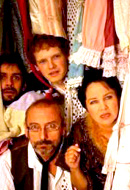 Montreal, a Love Story
Montreal, a Love StoryTuesday, June 28, 2011 by Allan Nadler | Jewish Ideas Daily » Daily Features
The second International Yiddish Theater Festival, an elaborate ten-day fete whose program ranges from carnavalesque performances to academic symposia, just wrapped up last week in Montreal. What is especially surprising about this celebration is that Montreal is a city with a Jewish population of less than 80,000.
 From the Four Corners
From the Four CornersTuesday, May 24, 2011 by Alex Joffe | Jewish Ideas Daily » Daily Features
Are most Jews white? The impression that this is so is partially the result of the calamitous and decimating events of the 20th century, in which the great centers of Europe were lost to Nazi genocide while those of the Middle East and North Africa were lost to Islam.
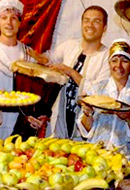 Mimouna!
Mimouna!Friday, May 13, 2011 by Aryeh Tepper | Jewish Ideas Daily » Daily Features
What did two million Israelis do when Passover ended this year? As in previous years, they celebrated Mimouna, a Moroccan Jewish holiday that is popularly observed by picnicking, barbecueing, and consuming moufletas (sweet North African pancakes). And what is Mimouna all about? No one really knows.
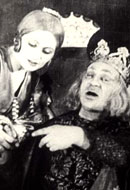 Shakespeare, Much Improved?
Shakespeare, Much Improved?Tuesday, March 22, 2011 by Nahma Sandrow | Jewish Ideas Daily » Daily Features
One of the few things people think they know about Yiddish theater in America is that once upon a time there was a production, probably of King Lear, advertised as "translated and much improved." Joel Berkowitz's history, Shakespeare on the American Yiddish Stage (2002), quotes the line but never gives an attribution, which suggests that nobody ever actually said it. But someone might have.
 Toward a Pluralistic Middle East?
Toward a Pluralistic Middle East?Thursday, March 17, 2011 by Aryeh Tepper | Jewish Ideas Daily » Daily Features
As the Middle East lurches through the present confusion of civil war, revolution, and mass protest, decent people everywhere wonder about the chances of a more pluralistic and democratic order emerging. One way of measuring progress in that direction will be to track the treatment of minorities like the Berbers and the Jews.
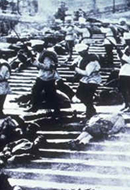 The Odessa File
The Odessa FileFriday, March 4, 2011 by Allan Nadler | Jewish Ideas Daily » Daily Features
Undoubtedly the most searing image of the port city of Odessa on the Black Sea is Sergei Eisenstein's reconstruction of a bloody massacre on its famed "Potemkin Steps" in his epic silent film, Battleship Potemkin (1925).
 Ladino!
Ladino!Thursday, January 13, 2011 by Yehudah Mirsky | Jewish Ideas Daily » Daily Features
Long overshadowed by its Yiddish cousin, Ladino—the "other" modern Jewish language, also known as Judeo-Spanish—has increasingly benefited from new waves of scholarly and cultural retrieval.
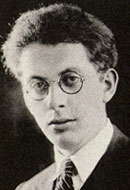 Summoned Home
Summoned HomeThursday, November 18, 2010 by Allan Nadler | Jewish Ideas Daily » Daily Features
In June 1934, the celebrated American Yiddish poet Jacob Glatstein (a/k/a Yankev Glatshteyn, 1896-1971) received an urgent summons to return to his native Lublin, Poland, where his mother lay at death's door. At the precise moment when so many Jews were desperately trying to make the reverse journey, Glatstein found himself on an unanticipated and almost certainly unwanted return home.
Editors' Picks
Pound Foolish John Stoehr, Forward. While Pound hailed Hitler, and Gertrude Stein cheered Franco, William Carlos Williams eschewed doctrine and orthodoxy. Herbert Leibowitz's compelling new biography of the modernist poet shows why.
Canon Fodder Itay Zutra, H-Net. For the eminent literary critic Dan Miron, the prominence of Jewish authors writing in non-Jewish languages is proof of the impossibility of assembling a modern Jewish literary canon..
Heartland of the Jewish Book George Washington University. A typographic panorama of Hebrew printing in the Ukraine. (With gallery of images)
Hebrew Underground Norman Berdichevsky, New English Review. After half a century of a USSR policy to condemn Hebrew as a "reactionary tool," the language emerged in the 1970's as the lifeblood of the "Refusenik" movement.
Drowning in the Red Sea Ruth R. Wisse, Jewish Review of Books. The history of Yiddish publications in America shows what moral credit writers of the highest order were prepared to extend to the Soviet Union.
Does Anyone Speak Arabic? Franck Salameh, Middle East Quarterly. Arab nationalists promoted the idea that anyone who speaks Arabic is an Arab. But for centuries, very few Middle Easterners have spoken the language called standard Arabic.
Holy Writ Edward Rothstein, New York Times. Transforming the English language, the King James Version also permanently shaped English and Western ideas about human nature, freedom, and responsibility.
Jewish-Muslim Metal Naama Shilony, Yesim Dikmen, Reuters. Lyrics drawn from the Hebrew liturgy, the Quran, and other religious texts feature in the repertoire of an Israeli band whose Arab fans travel to Turkey to hear it.
Dutch Treat Philologos, Forward. An unusually large number of Yiddish words made their way into the language of Holland. Take asjewijne, for example—or biskopetjes.
A Living, Humming Instrument Allan Nadler, Forward.
The great poet of cultural Zionism, Hayim Nahman Bialik (1873–1934), also gave voice to the predicament of loving religious Judaism while violating its norms.

